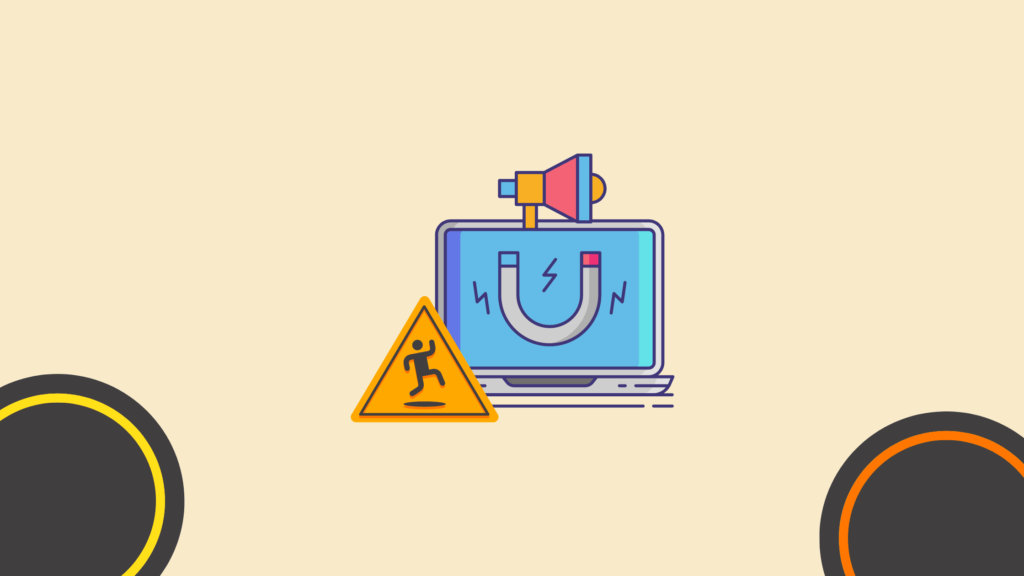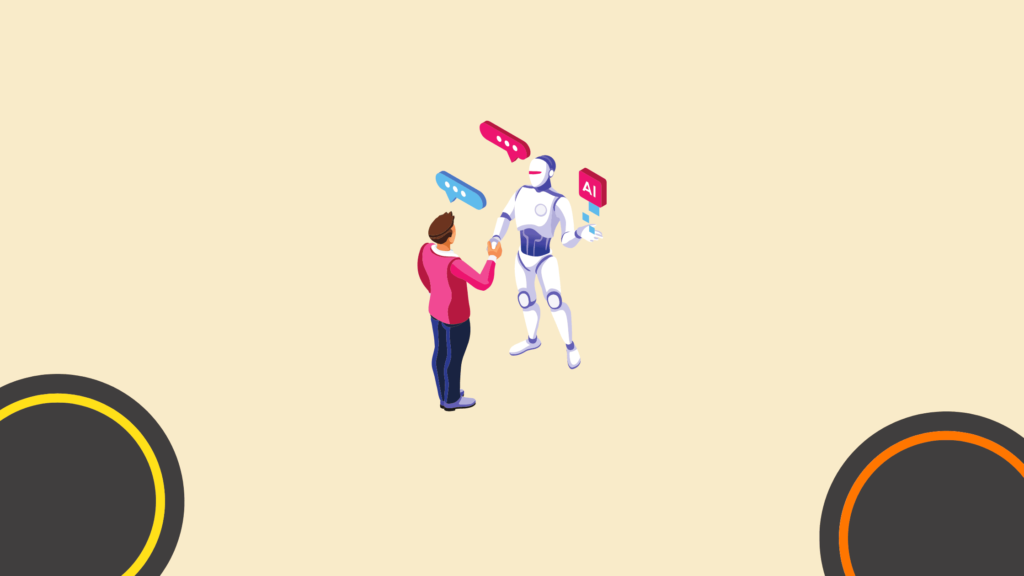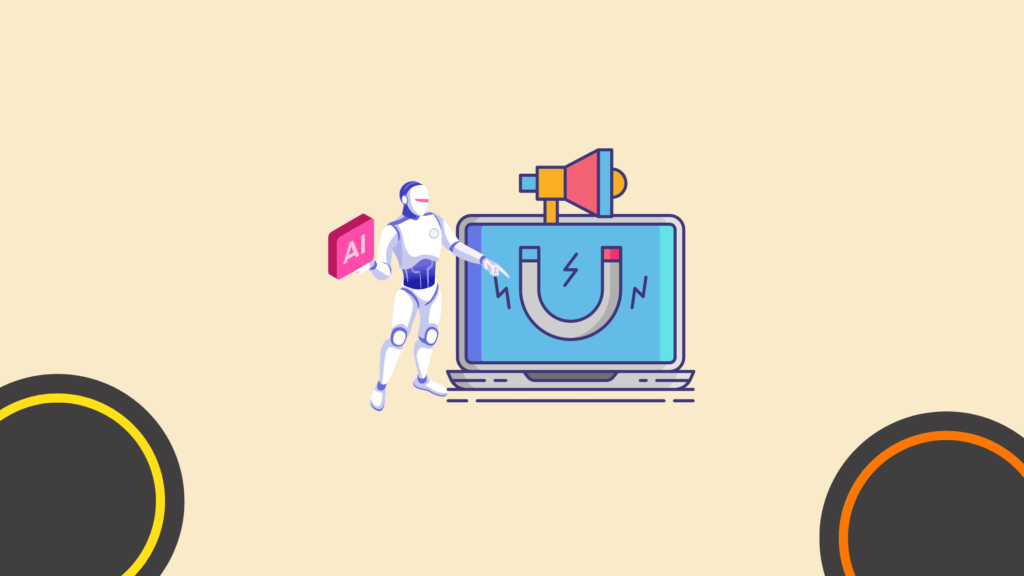How to Improve Inbound Marketing with AI in 2024 [Tips and AI Tools]
The success of any Inbound Marketing Strategy lies in its intrinsic ability to attract the right audience.
Now imagine supercharging that ability with the power of AI – crafting targeted content and experiences tailored to resonate with each individual customer.
As we enter the age of AI-driven marketing, businesses can leverage information-rich insights to ensure they focus their efforts effectively.
This blog post is your introductory guide to understanding and harnessing the potential of Integrating AI into your Inbound Marketing Strategy.
Chapters
How Can AI Automate and Optimize Tasks in Your Campaigns?

Inbound marketing is a strategy that focuses on attracting customers, or leads, via company-created content, thereby allowing potential customers to find the company naturally.
Unlike outbound marketing, which involves pushing products or services outwardly (like through cold-calling or TV advertisements), inbound marketing aims to create touchpoints where customers can engage with the business on their own terms.
At its core, inbound marketing leverages content marketing, blogs, events, SEO, social media, and more to create brand awareness and attract new business.
The inbound methodology typically follows a pattern: attract, convert, close, and delight. By producing relevant and engaging content tailored to address the problems and needs of ideal leads, brands hope to attract qualified prospects and build trust and credibility for their business.
Pitfalls of Inbound Marketing

Time-Consuming:
Creating quality content regularly takes time. This includes researching, writing, editing, and distributing. Brands may not see immediate results, as building a consistent and impactful online presence is a long-term game.
Requires Constant Update:
The digital world is always changing. What works for SEO this year might change next year. Inbound marketers have to stay updated with the changing algorithms and adjust strategies accordingly.
Not Always Targeted:
There’s a risk of attracting unqualified leads or those who are not ready to buy. If not executed correctly, you might spend resources on leads that will never convert.
Dependence on Technology:
The heavy reliance on digital tools, analytics, and automation platforms means that marketers need to be tech-savvy or have a team that is. Not understanding or misusing these tools can lead to ineffective strategies.
High Competition:
Since inbound marketing often relies heavily on content creation, brands face stiff competition in trying to rank their content higher on search engines or get it noticed amidst the deluge of content available online.
Requires Multiple Skill Sets:
Effective inbound marketing often requires a diverse range of skills – from SEO expertise to content creation, to social media management. Smaller businesses might struggle to have all these skills in-house.
Risks Being Too Passive:
While the idea is to “pull” customers in, there’s a risk of being too passive and missing out on proactive opportunities to reach potential clients.
What is AI-Enhanced Inbound Marketing?
Using AI’s analytical prowess, inbound marketing becomes more targeted, ensuring content reaches the right audience at the right time.

How to Improve Inbound Marketing with AI
1. Time Consuming
AI Solution: AI-powered content creation tools, like StoryLab.ai, can help in producing high-quality content in less time. By analyzing audience preferences, it not only suggests content topics but can even generate drafts, dramatically reducing the content creation process duration.
Check out this short video to see the AI Campaign Builder in action.
2. Requires Constant Update:
AI Solution: While AI algorithms monitor the digital landscape, StoryLab.ai can help keep your content fresh, relevant, and in alignment with current trends, ensuring you’re always at the forefront of your industry.
3. Not Always Targeted:
AI Solution: Advanced AI-driven analytics, integrated within platforms like StoryLab.ai, can pinpoint patterns and segment audiences precisely. It ensures that your content is tailored and reaches the audience segment it resonates with the most.
4. Dependence on Technology:
AI Solution: While there’s a dependence on technology, tools like StoryLab.ai are designed to be user-friendly. Instead of wrestling with multiple platforms, you receive a streamlined, intuitive experience, integrated with the power of AI.
5. High Competition:
AI Solution: With AI’s capability to analyze vast content volumes online, StoryLab.ai can highlight unique angles or lesser-covered topics, enabling brands to stand out amidst fierce competition.
6. Requires Multiple Skill Sets:
AI Solution: Platforms like StoryLab.ai are tailored to bridge skill gaps. Whether you’re lacking in SEO expertise or content creation, the tool can analyze and suggest optimizations, ensuring your content is always top-notch.
7. Risks Being Too Passive:
AI Solution: Predictive analytics, combined with StoryLab.ai’s content suggestions, can guide brands on when to engage proactively, ensuring they’re always one step ahead in their inbound marketing efforts.

How to be Effective with AI Marketing
When integrating AI into inbound marketing, it’s crucial to maintain a balance between automation and genuine human interaction.
While AI can efficiently analyze data, suggest content strategies, and personalize user experiences, it’s essential to ensure that the brand’s voice, ethos, and authentic engagement aren’t lost in the process.
Relying too heavily on automation might alienate customers seeking genuine interactions. Furthermore, privacy concerns must be addressed, as AI-driven marketing often relies on user data; it’s imperative to handle and process such data transparently and ethically.

Inbound Marketing and AI Best Practices
Do’s:
Do leverage AI’s data-driven insights for inbound marketing. Utilizing the vast amounts of data AI can process helps in tailoring strategies more effectively.
Do use AI for personalized content recommendations. By understanding user behaviors and preferences, AI can suggest relevant content that resonates with individual users.
Do integrate AI tools with existing marketing platforms for seamless operations. This ensures a harmonized marketing ecosystem where tools complement each other.
Do keep updating and training the AI models. As consumer behaviors evolve, it’s crucial for AI algorithms to stay updated to remain effective.
Do use AI to automate repetitive tasks such as data collection, segmentation, and basic interactions, freeing up time for more strategic endeavors.
Don’ts:
Don’t generalize your audience; use AI to understand and target specific segments. Each segment may have unique preferences, and AI can help in recognizing and catering to these nuances.
Don’t rely solely on AI for every inbound marketing decision. While AI can offer valuable insights, human intuition, creativity, and industry knowledge remain indispensable.
Don’t ignore the importance of privacy. With AI processing vast amounts of data, ensure that data collection and storage are compliant with privacy regulations.
Don’t set and forget your AI tools. Regular monitoring is essential to ensure that AI algorithms are working as intended and not leading to unintended consequences.
Don’t lose the human touch. While AI can help automate various aspects of marketing, genuine human interactions, empathy, and creativity are irreplaceable in creating meaningful customer relationships.
Conclusion,
Integrating AI tools and strategies, particularly with platforms like StoryLab.ai, can drastically transform inbound marketing challenges into opportunities. It equips businesses with the necessary firepower to make their inbound marketing campaigns efficient, laser-targeted, and competitive, ensuring they remain ahead of the curve.
FAQ
What is inbound marketing and how can AI improve it?
Inbound marketing is a strategy that attracts customers through relevant and helpful content. AI can improve it by personalizing content, automating tasks, and providing insights for better targeting.
How does AI enhance content creation in inbound marketing?
AI enhances content creation by analyzing data to determine what topics are most appealing to the audience, suggesting content ideas, and even generating initial content drafts.
Can AI be used to optimize SEO for inbound marketing?
Yes, AI tools can analyze search trends, suggest keywords, optimize website content for SEO, and continuously adapt strategies to the changing algorithms of search engines.
What role does AI play in improving customer engagement?
AI can analyze customer interactions to determine the most effective engagement strategies, personalize communications, and automate responses for better customer experiences.
How does AI help in lead scoring for inbound marketing?
AI assists in lead scoring by analyzing lead behavior and engagement, predicting which leads are more likely to convert, and helping prioritize follow-up efforts.
Can AI improve the user experience on inbound marketing platforms?
AI can tailor the user experience on websites and platforms by personalizing content recommendations, optimizing site navigation, and providing chatbot assistance.
How does AI contribute to social media strategy in inbound marketing?
AI tools can analyze social media trends, optimize posting times, personalize content for different segments, and measure engagement to refine social media strategies.
What is the role of predictive analytics in inbound marketing with AI?
Predictive analytics uses AI to forecast future customer behavior and market trends, allowing businesses to create more targeted and proactive inbound marketing strategies.
Can AI automate email marketing campaigns in inbound marketing?
Yes, AI can segment email lists, personalize email content, optimize send times, and analyze campaign performance to automate and improve email marketing efforts.
How does AI assist in measuring and analyzing inbound marketing performance?
AI tools provide advanced analytics to track and measure the performance of inbound marketing campaigns, offering insights into ROI, customer behavior, and the effectiveness of different channels and content.
How can AI improve the targeting of inbound marketing campaigns?
AI can analyze vast amounts of data to identify patterns and preferences, enabling more precise targeting by segmenting audiences based on behavior, interests, and demographics.
What role does AI play in optimizing landing pages for inbound marketing?
AI can test different elements of landing pages (like layout, content, and CTAs) and analyze user interactions to optimize for higher conversion rates.
How does AI impact content personalization in inbound marketing?
AI enables hyper-personalization of content by tailoring messages, recommendations, and experiences to individual users based on their past interactions and preferences.
Can AI tools help in creating more effective inbound marketing strategies?
Yes, AI tools can analyze market trends and customer feedback to help develop more effective inbound marketing strategies that resonate with the target audience.
How does AI enhance customer journey mapping in inbound marketing?
AI provides insights into each step of the customer journey, identifying key touchpoints and opportunities for engagement to create a more effective and seamless buyer’s journey.
What is the role of chatbots in AI-driven inbound marketing?
Chatbots, powered by AI, can engage visitors in real-time, provide instant assistance, qualify leads, and gather valuable data for personalized marketing efforts.
How can AI be used to improve inbound marketing ROI?
AI-driven analytics and automation can optimize marketing efforts for better results, reduce costs through automation, and provide precise measurement of ROI.
Can AI help in reducing the bounce rate in inbound marketing?
AI can analyze why visitors leave without converting and make real-time adjustments to content or design to engage visitors better and reduce bounce rates.
What is the importance of AI in content distribution for inbound marketing?
AI helps in identifying the best channels and times to distribute content, ensuring it reaches the right audience at the right time for maximum impact.
How does AI assist in real-time decision making in inbound marketing?
AI provides real-time data and insights, allowing marketers to make quick decisions about content, campaigns, and strategies to capitalize on emerging trends and customer behavior.
Author bio
 Brian has 15+ years as a marketing strategist and visionary leader with a track record of transforming the marketing function and propelling it to new heights for several SaaS companies as an advisor, consultant, and employee. He has spearheaded highly successful campaigns that captivated target audiences, optimizing the marketing funnel to maximize conversion rates, and accelerate sales cycles.
Brian has 15+ years as a marketing strategist and visionary leader with a track record of transforming the marketing function and propelling it to new heights for several SaaS companies as an advisor, consultant, and employee. He has spearheaded highly successful campaigns that captivated target audiences, optimizing the marketing funnel to maximize conversion rates, and accelerate sales cycles.
Brian Cohen is also the Co-Founder and CEO at StoryLab.ai. You can find more info about Brian on LinkedIn.
Master the Art of Video Marketing
AI-Powered Tools to Ideate, Optimize, and Amplify!
- Spark Creativity: Unleash the most effective video ideas, scripts, and engaging hooks with our AI Generators.
- Optimize Instantly: Elevate your YouTube presence by optimizing video Titles, Descriptions, and Tags in seconds.
- Amplify Your Reach: Effortlessly craft social media, email, and ad copy to maximize your video’s impact.